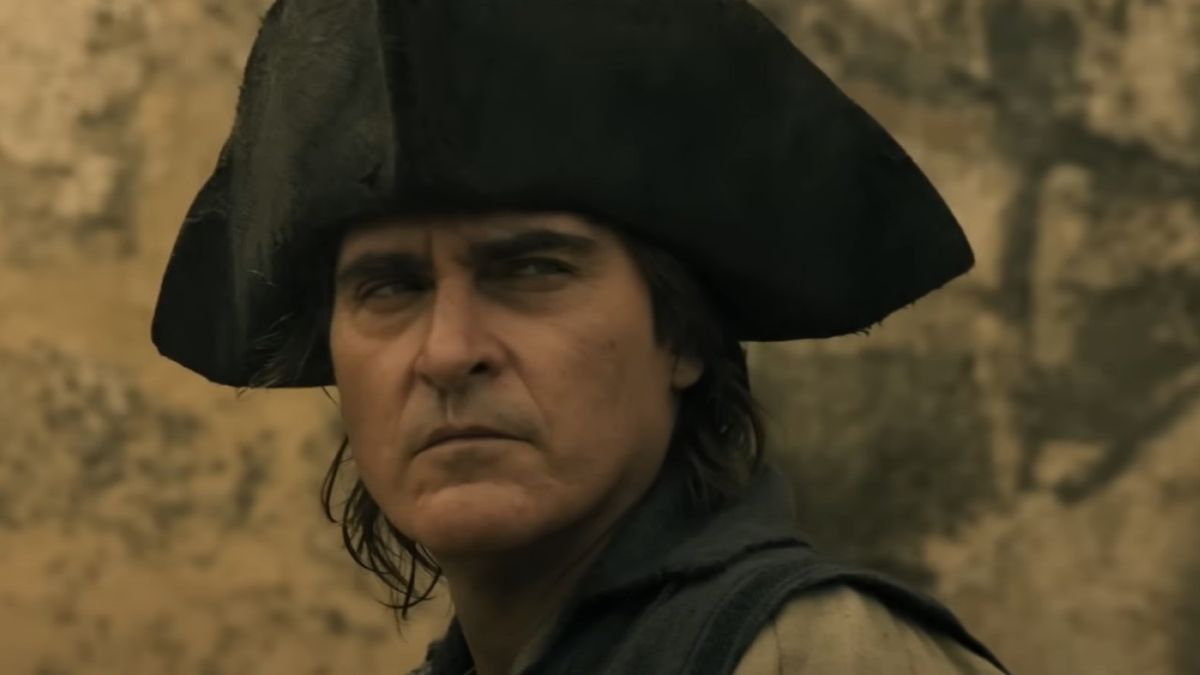Ridley Scott reunited with Joaquin Phoenix decades after Gladiator to bring the story of French leader Napoleon Bonaparte’s rise to power to the big screen. Amid that, a real-life battle is surrounding the movie. Since the 2023 new movie release hit theaters, historians have been taking shots at major historical inaccuracies — and they can’t seem to stop. On the other hand, one defender stated that not every historical event in Napoleon is untrue.
It’s not easy to portray historical events on the big screen that one wasn’t even alive to experience (and that can even be true with stories that a filmmaker lived through). Critics weighed in on Joaquin Phoenix and Ridley Scott‘s latest with a variety of thoughts. Some felt that the film didn’t effectively into who the titular character was and focused too much on his romance with Josephine. While Napoleon delivered epic battle scenes that caught critics’ and general audiences’ attention, history experts were more concerned with the inaccuracies Scott’s latest movie laid out in regard to the military events surrounding the French emperor. These academics spoke about historical insights you could learn from the movie and others they believed to have been added only to make the production more entertaining.
Historians Weigh in on Napoleon’s Creative Liberties
Napoleonic historian Zach White told The Guardian he felt the Alien director wrongly painted the ruler as a “Corsican ruffian,” giving into British propaganda in the process. Biographer Andrew Roberts also opined that the meeting between Bonaparte and Wellington at Plymouth was pure fiction. He also thought the Blade Runner helmer was wrong to represent the historic leader as “a dictator who goes mad with hubris.” Additionally, Roberts wasn’t happy with the false representation that Bonaparte’s defeat in Russia was due to the cold weather and took issue with how there was no mention of typhus.
Military historian Dan Snow pointed out issues of his own, saying that Napoleon didn’t fire at the pyramids in Egypt and wasn’t present when Marie Antoinette was guillotined. While Snow has nothing against the British filmmaker, he warned audiences that no history lesson will come from this epic historical film:
I love historical epics. I love Ridley Scott. But if you’re watching this movie, it ain’t a documentary.
When it comes to movies that are based on true stories, chances are you’re never truly going to get a fact-by-fact historical account of what really happened. It’s all about the director’s vision of what they think will appeal best to audiences and what would work with the narrative. Still, that doesn’t mean there aren’t still some solid truths to be found.
What Napoleon Got Right From A Historical Perspective
Paul Biddiss, a military tech advisor for Napoleon, defended the $200 million budget movie. He made a great point that it’s hard to know what’s real and not real from the man’s conquests, as the French emperor was known for exaggerating his own victories. Those he told his hyperbolic accounts to were quick to believe him, which was apparently how he was able to make his way up the success ladder. Biddiss also defend the film’s realism in its military strategies. He declared to The Guardian his own theory of why historians felt the events told on screen were far from the truth:
I would like to criticise some of the historians who have criticised this film. For a start, many of them are guilty of using the famous painting of Napoleon crossing the Alps on the covers of their books, which is certainly an inaccurate depiction.
He’s referring to the well-known Jacques-Louis David painting of the general’s uniform bulging out as his horse Marengo rears to the sky in a dramatic fashion. Paul Biddiss argued that renowned strategist was actually riding a mule and wearing a thick coat during that particular event in history.
One thing that historians like Dan Snow gave Napoleon praise for was the military tactics shown in the movie. Using manuals from Napoleonic generals and running a boot camp in a former Napoleonic barracks for 500 extras, Paul Biddiss was able to plan troop movements similar to military commanders of that time. Extras were taught about how to hold a musket, different types of cannons and munitions and other tactics used by the English of that era. Most importantly, extras had to learn not to laugh or smile when the cameras rolled by pretending the other side was threatening their lives for deserting. Even if the soldiers’ formations were created using CGI, the cavalry ran and cannon fusillades were all real.
So while it appears Ridley Scott’s Napoleon is not perfect when it comes to how it aligns with history, that doesn’t mean every historical fact about the movie was false. Scott’s blunt response about his film’s inaccuracies was simply, “Get a life.” Clearly, he’s not bothered by what the historians have to say. You can check the movie for yourself by visiting a theater now or, if you have an Apple TV+ subscription, you can wait to stream it at a later date.
